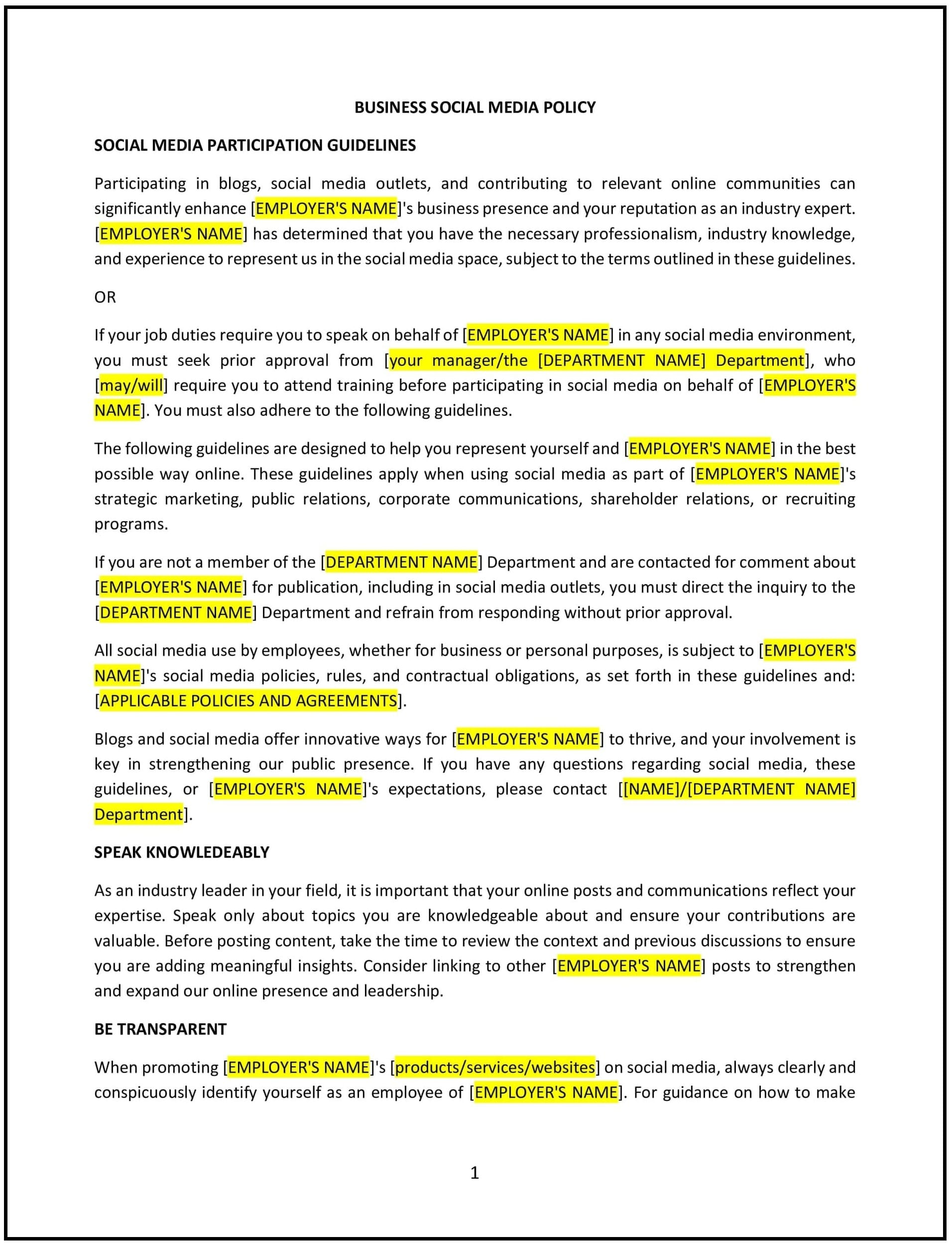Business social media policy (Wisconsin): Free template
Got contracts to review? While you're here for policies, let Cobrief make contract review effortless—start your free review now.

Customize this template for free
Business social media policy (Wisconsin)
A business social media policy helps Wisconsin businesses establish clear guidelines for employees regarding the use of social media for work-related purposes, both during and outside of work hours. This policy outlines the expectations for employees’ conduct on social media platforms, addressing issues such as confidentiality, professionalism, and the company’s reputation. It also clarifies the boundary between personal and professional use of social media, and the consequences for violating the policy.
By implementing this policy, businesses can protect their brand, ensure that employees understand their responsibilities when engaging on social media, and mitigate potential risks associated with online behavior.
How to use this business social media policy (Wisconsin)
- Define acceptable use: Outline the company’s expectations for employees when using social media for work-related purposes, such as engaging with customers, promoting company events, or sharing company news. Specify which platforms employees are encouraged to use for professional purposes.
- Set guidelines for personal use: Clarify what is considered acceptable personal use of social media during work hours, including any restrictions on excessive use that may interfere with productivity or workplace morale.
- Address company representation: Specify that employees should not present themselves as representing the company unless authorized to do so, and that they must be clear that their personal views are not those of the company. Employees should also be aware that their conduct on social media can reflect on the company.
- Maintain confidentiality: Emphasize the importance of not disclosing confidential company information, trade secrets, or proprietary data on social media platforms. This includes internal company discussions, financial information, and other sensitive data.
- Set expectations for professionalism: Establish that employees should maintain professionalism in their posts, ensuring that they do not post offensive, discriminatory, or inappropriate content. Employees should avoid engaging in online arguments, hate speech, or posting content that could damage the company’s reputation.
- Provide guidelines for conflict resolution: Outline how employees should handle social media disputes or complaints related to the company or its products/services, including escalating issues to the appropriate internal channels rather than engaging in public online arguments.
- Clarify consequences of policy violations: Specify the potential consequences for violating the policy, including disciplinary actions up to and including termination, depending on the severity of the violation.
- Encourage employee advocacy: Encourage employees to advocate for the company in a positive and respectful manner, providing guidelines on how they can promote the company’s mission, values, and services online while maintaining authenticity.
Benefits of using this business social media policy (Wisconsin)
This policy offers several benefits for Wisconsin businesses:
- Protects the company’s reputation: Clear guidelines for social media use help ensure that employees do not post content that could harm the company’s image, brand, or relationships with customers.
- Promotes professionalism: The policy helps maintain a professional image both online and offline by setting expectations for employees’ conduct on social media platforms.
- Reduces legal risks: By addressing confidentiality and intellectual property concerns, the policy helps reduce the risk of accidental disclosure of sensitive company information, which could lead to legal issues.
- Enhances employee accountability: The policy sets clear guidelines on how employees should represent the company online, fostering accountability and reducing the likelihood of misconduct.
- Improves workplace culture: By encouraging positive employee engagement and responsible use of social media, the policy can enhance workplace culture and employee morale, ensuring that employees feel empowered to represent the company positively.
Tips for using this business social media policy (Wisconsin)
- Communicate the policy clearly: Ensure that all employees are aware of the policy, especially those who may be engaging with customers or representing the company on social media platforms.
- Monitor social media activity: Regularly monitor social media platforms for any potential issues or violations of the policy, and address them promptly to avoid escalation.
- Provide training: Offer training to employees on how to use social media professionally, how to protect the company’s reputation online, and how to handle difficult online situations responsibly.
- Encourage positive engagement: Encourage employees to share positive stories, company updates, and achievements on social media, reinforcing the company’s values and mission.
- Review periodically: Regularly review the policy to ensure it reflects any changes in social media trends, company practices, or legal requirements, ensuring that it remains effective and relevant.